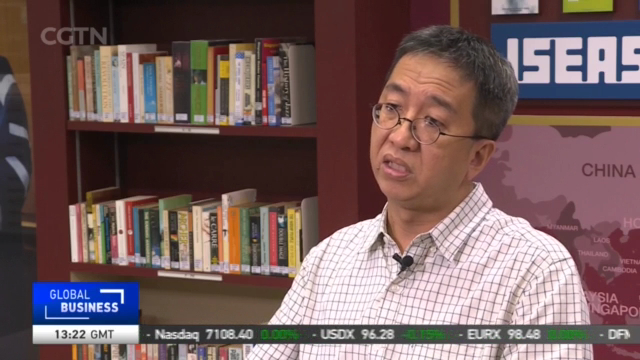
23:21, 25-Oct-2018
March to Singapore: Ride-hailing battle in Southeast Asia intensified
Updated
23:09, 28-Oct-2018
03:31

Indonesian tech giant Go-Jek is preparing to lock horns with regional rival Grab in the ride-hailing arena. A household name in Indonesia and a force to be reckon with, some observers are saying that it will put a dent in Grab's business. CGTN's Miro Lu has the story.
It looks like ride-hailing giant Grab's monopoly in Southeast Asia is coming to an end. Indonesian tech giant Go-Jek is to launch in Singapore as early as November. Grab bought its US rival Uber's Southeast Asia business earlier this year. Ride fares rose quickly after that, while drivers' incentives took a nosedive. After months of investigation, Singapore's Competition and Consumer Commission fined the two companies US$9.5 million and ordered Grab to remove exclusive contracts with drivers and car rental companies.
Cassey Lee is a senior fellow in the Yusof Ishak Institute in Singapore and he researches competition policies and law in the ASEAN region. Lee says that the CCCS' mandate to lower barriers-to-entry is both timely and important for the Indonesian ride-share giant.
CASSEY LEE HONG KIM, SENIOR FELLOWYUSOF ISHAK INSTITUTE "Definitely Go-Jek poses a considerable threat, or it has the capability to compete intensively with Grab because it has quite a substantial financial backing and it has a strong domestic sort of base in Indonesia, so it's not entirely a newcomer."
MIRO LUSINGAPORE "The global demand for ride-hailing service has skyrocketed, disrupting traditional taxi business. In 2017, the market was valued at around US$37 billion but is projected to grow eightfold by 2030. In Southeast Asia alone, both Grab and Go-Jek will likely go head-to-head in a regional battlefield marked by a potential price war."
The increase in fare after the merger has drawn complaints from Singaporeans.
ROSE 28 "Yeah, definitely, the price has increased. And Grab used to have a lot of discounts, but now, there's nothing anymore. With other competitors coming in, it's a lot better for us, we can get a comparison in the prices."
LIYANA 25 "I think it's a better idea that other players are coming in rather than just Grab, because it's a monopoly. I don't think it's fair."
Besides Go-Jek, smaller startups have quietly entered the market since the Grab-Uber merger. There are about nine on-demand chauffeur apps in Singapore, but Grab still holds the lion's share of the market.
TADA is a fledgling home-grown startup that's gaining traction among drivers in the country. With zero commission, it has attracted around 16,000 registered drivers and 85,000 riders.
JONATHAN CHUA, GENERAL MANAGER TADA "The merger actually created opportunities for new players to enter. Secondly, the merger created a vacuum where we could identify the issues that exist in the ride-hailing industry. It became clearer when the merger happened, for us, we could see where we can create value especially in drivers' livelihood, for fares, and we created a product to solve these problems."
While contest in the lion city ground to a halt following the Grab-Uber merger, the combination of the sanctions on Grab and the close-approaching launch of Go-Jek is sure to shift competition back into the fifth gear. Miro Lu, CGTN, Singapore.

SITEMAP
Copyright © 2018 CGTN. Beijing ICP prepared NO.16065310-3
Copyright © 2018 CGTN. Beijing ICP prepared NO.16065310-3